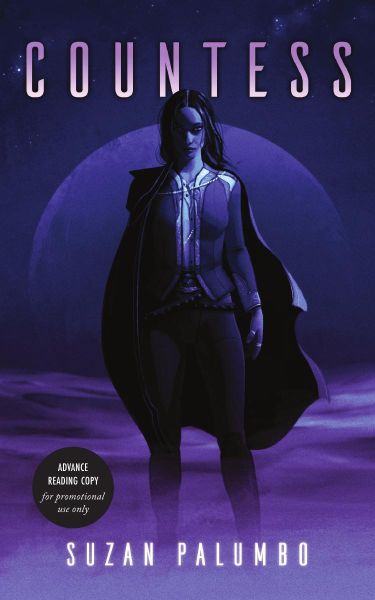Stand Up
Countess
By Suzan Palumbo

2 Aug, 2024
0 comments
Suzan Palumbo’s 2024 Countess is an upcoming stand-alone revolutionary space opera.
Forced off Terra by climate-change-induced flooding, Virika Sameroo’s Caribbean ancestors fled to the Exterran Antilles system. An immigration lottery win saw Virika and her parents escape economic privation for the comparative wealth of Invicta, capital of the Æcerbot Empire.
All the Empire asked of her father was to work hard for poor wages for as long as it took for an industrial accident to kill him. All the Empire asked of Virika was for her abandon her parents’ culture and become in all ways possible a standardized subject of the Empire.
Virika has followed the rules her whole life. Now she will enjoy the reward.
When Captain Whitehall of the starship Oestra falls ill, he must select a subordinate to temporarily replace him. Given the choice of two officers of equal rank, Virika and Lyric, Whitehall chooses Virika. It’s an enormous vote of confidence in the immigrant, and a development that further cements Lyric’s loathing of Virika.
Whitehall dies soon after the starship reaches port. Not too long after that, Virika is arrested for his murder. The trial that follows is swift. Its outcome is never in question, the court having decided what verdict it wanted before Virika was assigned her inept defender. As a final twist of the knife, the crucial evidence against Virika is provided by Virika’s lover Alba.
Found guilty, Virika is sentenced to an excessive number of life sentences. She is dispatched to the Pit, a prison from which nobody returns. More accurately, a prison from which nobody has returned… until now.
Prisoners are supposed to languish in misery until they expire of despair. Virika turns to art. Once the administration notices, they destroy the art. However, among the guards is Kalima, already unhappy with her role in the system. The art is the catalyst needed to convince Kalima to help Virika escape… regardless of the cost to Kalima.
Now freed, Virika has access to a plot-convenient treasure trove. She will reinvent herself as a mysterious Empire aristocrat before launching an inordinately convoluted plot to punish all those who victimized her. Virika is now a Countess. Her scheme of revenge is far more straightforward than that adopted by the Count of Monte Cristo.
She will foment a revolution!
~oOo~
Yes, we’re all disappointed that Alba decided that protecting her career was more important than keeping Virika out of space prison, but not half as disappointed as Virika was. Was Virika naïve? Should an oppressed person ever trust a significant other who is part of the establishment? Have fun discussing that in comments.
Something to keep an eye out for: bookseller software will try very hard to “correct” Suzan to Susan.
Strictly speaking, Exterran Antilles is an independent nation. However, in the interests of unimpeded access to the system’s mineral wealth, the Empire has orchestrated substantial concessions from Exterran Antilles to the Empire. Functionally, the Empire controls the economy and it has a habit of overthrowing any government or reformer who seems likely to change how things work1. It’s possible that Palumbo has a real-world model in mind…
Speaking of real-world models, the novel acknowledges what I think of as the Wat Tyler issue. Revolutions can either go the Cromwell path, utterly crushing the conservatives, or they can, like Tyler, try to negotiate with the government from what they believe is a position of strength. The problem with the second path is that it’s very tempting for established governments to use negotiations to get close enough to the other side’s leader to kill said leader. I would say it seems unlikely any revolutionary would be foolish enough to fall for that except they do, again and again. In this case, however, Virika and her allies have learned from experience. The result isn’t quite what the Empire expects.
This is a novella, a length I enjoy. In this case, I would have preferred that the story and its characters be developed at greater length. There’s room for embellishment; the Dumas novel from which the author derives some elements of the tale is not known for its brevity. On the other hand, novellas by their nature force breakneck pacing and perhaps some readers would prefer that.
Countess is available here (Amazon US), here (Amazon Canada), here (Amazon UK), here (Apple Books), here (Barnes & Noble), here (Chapters-Indigo), and here (Words Worth Books).
1: Due to how interstellar flight works, it is easy to disrupt trade. I do not believe this is ever stated out loud, but it would be trivial for Exterran Antilles to end trade simply by targeting the gates on which trade depends.
